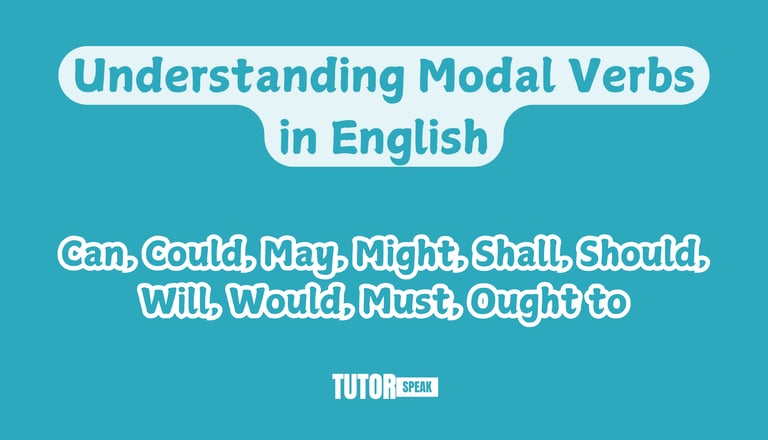Understanding Modal Verbs in English
Modal verbs are special auxiliary verbs that express abilities, possibilities, permissions, obligations, or other types of necessity. They are different from regular verbs because they don't change their form (no -s, -ed, or -ing endings) and are followed by the base form of a verb. Here’s a guide to modal verbs with explanations, examples, and practice exercises.
TutorSpeak
12/7/20242 min read


Understanding Modal Verbs in English
Modal verbs are special auxiliary verbs that express abilities, possibilities, permissions, obligations, or other types of necessity. They are different from regular verbs because they don't change their form (no -s, -ed, or -ing endings) and are followed by the base form of a verb.
Here’s a guide to modal verbs with explanations, examples, and practice exercises.
1. What Are Modal Verbs?
The main modal verbs are:
Can, Could, May, Might, Shall, Should, Will, Would, Must, Ought to
2. Uses of Modal Verbs
a) Ability
Can: Expresses present or general ability.
Example: She can play the piano.Could: Expresses past ability or a polite request.
Example: He could run fast when he was younger.
b) Possibility
May, Might, Could: Express the possibility of something happening.
Examples:
It may rain later.
She might be at the park.
c) Permission
Can, May: Used to ask for or give permission.
Examples:
You can leave early today.
May I borrow your book?
d) Obligation or Necessity
Must: Strong obligation or necessity.
Example: You must wear a seatbelt.Should, Ought to: Suggests advice or a weaker obligation.
Examples:
You should exercise regularly.
We ought to respect our elders.
e) Prohibition
Cannot (Can’t), Must not (Mustn’t): Expresses prohibition.
Examples:
You can’t park here.
You must not touch the stove.
f) Prediction
Will, Shall: Express certainty about the future.
Examples:
It will be sunny tomorrow.
Shall we go for a walk?
g) Polite Requests or Offers
Could, Would, Shall: Used for polite requests or offers.
Examples:
Could you help me with this?
Would you like some tea?
3. Examples in Sentences
Can: I can swim well.
Could: Could you please open the window?
May: You may take a break now.
Might: We might visit Paris next summer.
Shall: Shall we begin the meeting?
Should: You should drink more water.
Will: I will call you later.
Must: You must finish your homework.
Ought to: He ought to apologize for being rude.
4. Practice Exercises
a) Fill in the blanks with the correct modal verb (can, could, may, might, should, must, will):
You ________ finish your project before the deadline.
________ I borrow your pen for a moment?
She ________ come to the party, but she’s not sure yet.
When I was a child, I ________ climb trees easily.
You ________ not smoke in this building.
b) Choose the correct modal verb:
He (should/must) apologize for his mistake.
You (may/might) leave early if you finish your work.
(Can/Could) you help me with this heavy box?
They (will/might) go to the beach if the weather is nice.
We (must/ought to) wear helmets while riding a bike.
c) Rewrite the sentences using modal verbs:
It’s necessary to take your passport when you travel.
It’s possible that she is at home now.
He knows how to play the guitar.
It’s not allowed to use your phone here.
It’s a good idea to study for the test.
6. Tips for Using Modal Verbs
Modal verbs are always followed by the base form of a verb (no "to").
Example: You can go. (NOT You can to go.)They don’t take "s" in the third person singular.
Example: He can help. (NOT He cans help.)
By practicing these examples and exercises, you'll gain confidence in using modal verbs in everyday conversations!



